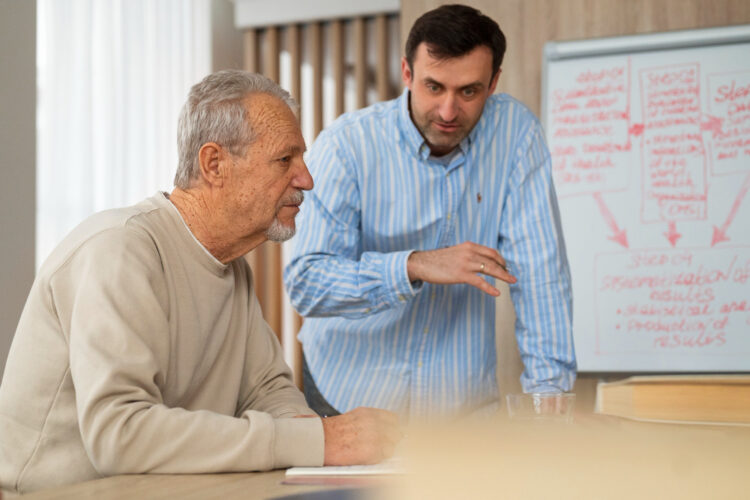Imagine a career where you make a genuine difference in people’s lives, where each day brings the reward of knowing you’ve offered comfort, care, and companionship. That’s the reality for many who undertake an Individual Support Ageing Course. It’s more than just a qualification; it’s a journey that equips you with a profound set of practical and interpersonal skills invaluable in supporting aged individuals to live fulfilling and dignified lives.
This isn’t just about learning the mechanics of care; it’s about understanding the nuances of ageing, fostering genuine connections, and becoming a truly compassionate and capable support worker. So, what are these top skills you’ll cultivate on this enriching path? Let’s delve in
1. Person-Centred Care Takes the Individual’s Needs Exceptionally into Account
You’ll learn how to customise your care to fit every individual’s needs and preferences under professional certification like CHC33021 Certificate III in Individual Support (Ageing). This approach is called “person-centred care,” and it guides today’s support for older people.
You will gain knowledge on:
- Let individuals keep their unique choices, traditions and living routines.
- Make sure that care plans fit with the person’s goals.
- Be aware that emotional needs are every bit as crucial as physical needs.
This approach shows seniors as people with interests and histories, not solely as patients. This elevates really good care to the level of great care.
2. Effective Communication
In this field, communication means more than just telling people what to do or giving updates. It means paying attention, showing care, and being patient in tough moments.
You will have many opportunities to practise skills during your Individual Support Ageing Course.
- Using language that people can understand and rely on
- Looking at body language and expressions, particularly when you’re with those who have dementia
- Talking professionally to families, supervisors and healthcare staff
Strong communication eases people’s anxieties, settles conflicts and produces happy times. This skill can really impact someone’s day and yours as well.
3. Providing Help with Daily Life
From getting someone dressed to being there during meals or in the restroom, support workers ensure the person’s dignity is not affected.
Although this idea sounds basic, it isn’t easy to do it well. You will get instructions on how to:
- Handle personal tasks with care and in a safe manner
- Help people move safely and avoid falling
- Employ the correct way to handle things to protect yourself and the client from injury.
Every action is done respectfully and with care so seniors can keep their independence as much as possible.

4. Being Aware of Ageing and Associated Health Issues
Understanding the physical, mental, and emotional changes accompanying ageing is essential to supporting older people.
During your course, you will investigate:
- Common age-related illnesses like diabetes, dementia, and arthritis
- How to help with memory loss and indicators of cognitive decline
- Fundamental understanding of end-of-life assistance and palliative care
If you have this understanding, you’ll be able to react with compassion and knowledgeable care techniques. It also entails being aware of when to consult a healthcare provider.
5. Inclusivity and Cultural Sensitivity
Australia’s aged care workforce supports people from various walks of life—different ethnicities, faiths, languages, and identities. Being culturally sensitive is not merely a “bonus skill” but necessary.
You will be inspired to:
- Respect diverse beliefs, traditions, and communication styles
- Learn how culture can shape care preferences (e.g., diet, modesty, family roles)
- Reflect on your own biases and perspectives
Creating an inclusive environment is the focal point to building trust and ensuring everyone feels truly seen and valued.
6. Working Within Legal and Ethical Boundaries
One of the most important aspects of being a support worker is understanding the rules that govern your role. The Individual Support Ageing Course equips you with knowledge around:
- Duty of care and professional boundaries
- Privacy, confidentiality, and handling sensitive information
- Understanding elder abuse and mandatory reporting procedures
This legal awareness protects you, your client, and your workplace and is essential to being a trusted care professional.
Why We Need These Skills More Than We Ever Have
Australia is experiencing a quick rise in its ageing population. As per Australian Bureau of Statistics, by 2057, people aged 65 and older will represent about a quarter of the country’s population. Therefore, more skilled and kind workers are needed in aged care.
An employer looks for much more than your education or work experience—they want to see sincerity, clear communication, strength and a professional attitude. A good Individual Support Ageing Course does precisely this.
Good Job Prospects After You Complete Your Course
When you have met the requirements, you may work in roles such as:
- Aged care support worker in residential care or at-home care
- Personal care for clients with dementia
- Respite worker supporting family caregivers
- Pathways into specialised care (like palliative or disability support)
You can also continue learning by studying for diplomas or aged care management qualifications, which can help your career development.
Final Thoughts
An Individual Support Ageing Course does more than teach skills for employment—it builds your career. You will master the abilities for daily living and learn the skills that make a difference in other people’s well-being.
Because sometimes growing older leads to loneliness, you can help by bringing kindness, appreciation, and proficient care to those most in need.
And that’s something significant to be proud of.

